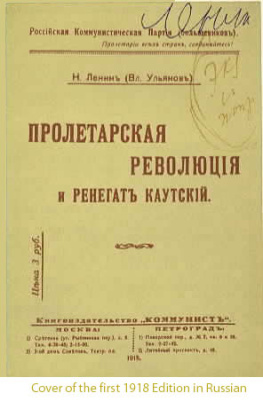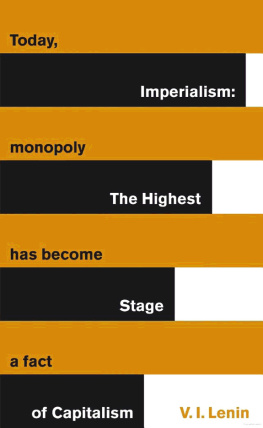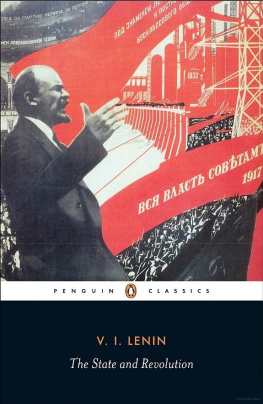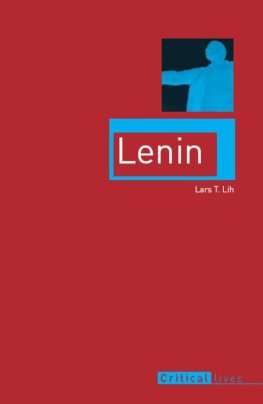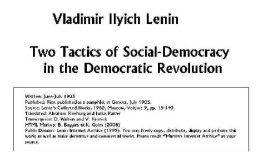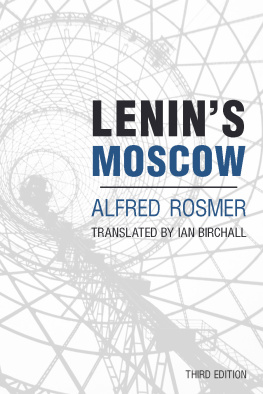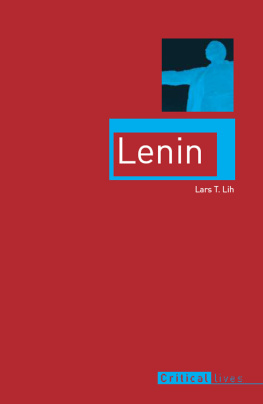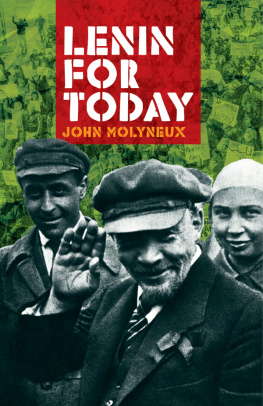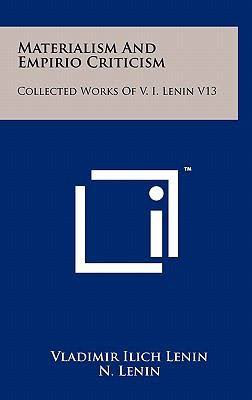Vladimir Lenin - What is to Be Done?: Burning Questions of Our Movement
Here you can read online Vladimir Lenin - What is to Be Done?: Burning Questions of Our Movement full text of the book (entire story) in english for free. Download pdf and epub, get meaning, cover and reviews about this ebook. year: 1969, publisher: International Publishers, genre: Politics. Description of the work, (preface) as well as reviews are available. Best literature library LitArk.com created for fans of good reading and offers a wide selection of genres:
Romance novel
Science fiction
Adventure
Detective
Science
History
Home and family
Prose
Art
Politics
Computer
Non-fiction
Religion
Business
Children
Humor
Choose a favorite category and find really read worthwhile books. Enjoy immersion in the world of imagination, feel the emotions of the characters or learn something new for yourself, make an fascinating discovery.
- Book:What is to Be Done?: Burning Questions of Our Movement
- Author:
- Publisher:International Publishers
- Genre:
- Year:1969
- Rating:3 / 5
- Favourites:Add to favourites
- Your mark:
- 60
- 1
- 2
- 3
- 4
- 5
What is to Be Done?: Burning Questions of Our Movement: summary, description and annotation
We offer to read an annotation, description, summary or preface (depends on what the author of the book "What is to Be Done?: Burning Questions of Our Movement" wrote himself). If you haven't found the necessary information about the book — write in the comments, we will try to find it.
What is to Be Done?: Burning Questions of Our Movement — read online for free the complete book (whole text) full work
Below is the text of the book, divided by pages. System saving the place of the last page read, allows you to conveniently read the book "What is to Be Done?: Burning Questions of Our Movement" online for free, without having to search again every time where you left off. Put a bookmark, and you can go to the page where you finished reading at any time.
Font size:
Interval:
Bookmark:
What Is To Be Done?
Burning Questions of our Movements
Vladimir Ilyich Lenin
Written: Written between the autumn of 1901 and February 1902.
Published: Lenins Selected Works , Volume 1, pp. 119 - 271. First published as a separate work in March 1902.
Source: Lenins Collected Works, Foreign Languages Publishing House, 1961, Moscow, Volume 5, pp. 347-530.
Translated: Joe Fineberg and George Hanna
Original Transcription & Markup: Tim Delaney (1999)
Re-Marked up & Proofread by: K. Goins (2008)
Public Domain: Lenin Internet Archive (1999). You may freely copy, distribute, display and perform this work; as well as make derivative and commercial works. Please credit Marxists Internet Archive as your source.
HTML Version: http://marxists.org/archive/lenin/works/1901/witbd/index.htm
Converted to eBook format by: Sajjan Singh (2014)
Lenins work What Is To Be Done? was written at the end of 1901 and early in 1902. In Where To Begin, published in Iskra, No. 4 (May 1901), Lenin said that the article represented a skeleton plan to be developed in greater detail in a pamphlet now in preparation for print.
Lenin began the actual writing of the book in the autumn of 1901. In his Preface to the Pamphlet Documents of the Unity Conference, written in November 1901, Lenin said that the book was in preparation to be published in the near future. In December Lenin published (in Iskra, No. 12) his article A Talk with Defenders of Economism, which he later called a conspectus of What Is To Be Done? He wrote the Preface to the book in February 1902 and early in March the book was published by Dietz in Stuttgart. An announcement of its publication was printed in Iskra, No. 18, March 10, 1902.
In republishing the book in 1907 as part of the collection Twelve Years, Lenin omitted Section A of Chapter V, Who Was Offended by the Article Where To Begin, stating in the Preface that the book was being published with slight abridgements, representing the omission solely of details of the organisational relationships and minor polemical remarks. Lenin added five footnotes to the new edition.
The text of this volume is that of the 1902 edition, verified with the 1907 edition.
Contents
...Party struggles lend a party strength and vitality; the greatest proof of a partys weakness is its diffuseness and the blurring of clear demarcations; a party becomes stronger by purging itself...
(From a letter of Lassalle to Marx, of June 24, 1852)
According to the authors original plan, the present pamphlet was to have been devoted to a detailed development of the ideas expressed in the article Where To Begin, (Iskra, No. 4, May 1901). We must first apologise to the reader for the delay in fulfilling the promise made in that article (and repeated in response to many private inquiries and letters). One of the reasons for this delay was the attempt, undertaken in June of the past year (1901), to unite all the Social-Democratic organisations abroad. It was natural to wait for the results of this attempt, for, had the effort proved successful, it would perhaps have been necessary to expound Iskras conceptions of organisation from a somewhat different approach; in any case, such a success promised to put an end very quickly to the existence of the two trends in the Russian Social-Democratic movement. As the reader knows, the attempt failed, and, as we propose to show, was bound to fail after the new swing, of Rabocheye Dyelo, in its issue No. 10, towards Economism. It was found to be absolutely essential to begin a determined struggle against this trend, diffuse and ill-defined, but for that reason the more persistent, the more capable of reasserting itself in diverse forms. Accordingly, the original plan of the pamphlet was altered and considerably enlarged.
Its main theme was to have been the three questions raised in the article Where To Begin the character and main content of our political agitation; our organisational tasks; and the plan for building, simultaneously and from various sides, a militant, all-Russia organisation. These questions have long engaged the mind of the author, who tried to raise them in Rabochaya Gazeta). It became clear beyond doubt that the differences regarding the solution of the three questions mentioned were explainable to a far greater degree by the basic antithesis between the two trends in the Russian Social-Democratic movement than by differences over details. On the other hand, the perplexity of the Economists over the practical application of our views in Iskra clearly revealed that we often speak literally in different tongues and therefore cannot arrive at an understanding without beginning ab ovo, and that an attempt must be made, in the simplest possible style, illustrated by numerous and concrete examples, systematically to clarifyall our basic points of difference with all the Economists. I resolved to make such an attempt at clarification, fully realising that it would greatly increase the size of the pamphlet and delay its publication; I saw no other way of meeting my pledge I had made in the article Where To Begin. Thus, to the apologies for the delay, I must add others for the serious literary shortcomings of the pamphlet. I had to work in great haste, with frequent interruptions by a variety of other tasks.
The examination of the above three questions still constitutes the main theme of this pamphlet, but I found it necessary to begin with two questions of a more general nature why such an innocent and natural slogan as freedom of criticism should be for us a veritable war-cry, and why we cannot come to an understanding even on the fundamental question of the role of Social-Democrats in relation to the spontaneous mass movement. Further, the exposition of our views on the character and substance of political agitation developed into an explanation of the difference between trade-unionist politics and Social-Democratic politics, while the exposition of our views on organisational tasks developed into an explanation of the difference between the amateurish methods which satisfy the Economists, and the organisation of revolutionaries which we hold to be indispensable. Further, I advance the plan for an all-Russia political newspaper with all the more insistence because the objections raised against it are untenable, and because no real answer has been given to the question I raised in the article Where To Begin as to how we can set to work from all sides simultaneously to create the organisation we need. Finally, in the concluding part, I hope to show that we did all we could to prevent a decisive break with the Economists, a break which nevertheless proved inevitable; that Rabocheye Dyelo acquired a special significance, a historical significance, if you will, because it expressed fully and strikingly, not consistent Economism, but the confusion and vacillation which constitute the distinguishing feature of an entire period in the history of Russian Social-Democracy; and that therefore the polemic with Rabocheye Dyelo, which may upon first view seem excessively detailed, also acquires significance, for we can make no progress until we have completely put an end to this period.
N. Lenin
February 1902
Freedom of criticism is undoubtedly the most fashionable slogan at the present time, and the one most frequently employed in the controversies between socialists and democrats in all countries. At first sight, nothing would appear to be stranger than the solemn appeals to freedom of criticism made by one of the parties to the dispute. Have voices been raised in the advanced parties against the constitutional law of the majority of European countries which guarantees freedom to science and scientific investigation? Something must be wrong here, will be the comment of the onlooker who has heard this fashionable slogan repeated at every turn but has not yet penetrated the essence of the disagreement among the disputants; evidently this slogan is one of the conventional phrases which, like nicknames, become legitimised by use, and become almost generic terms.
Next pageFont size:
Interval:
Bookmark:
Similar books «What is to Be Done?: Burning Questions of Our Movement»
Look at similar books to What is to Be Done?: Burning Questions of Our Movement. We have selected literature similar in name and meaning in the hope of providing readers with more options to find new, interesting, not yet read works.
Discussion, reviews of the book What is to Be Done?: Burning Questions of Our Movement and just readers' own opinions. Leave your comments, write what you think about the work, its meaning or the main characters. Specify what exactly you liked and what you didn't like, and why you think so.


